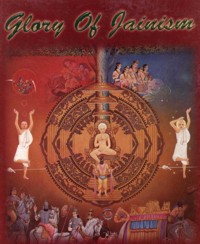Revati
Bhagwan Mahavir, once, arrived in sakoshtak park on the outskirts of village Medhiya in Shravasti. Goshalak, once Mahavir’s disciple, had turned his rival. He tried to set him afire and shot tejoleshya (beam of fire) at him but it could do no great harm to Bhagwan. After seven days, Goshalak died, but Bhagwan suffered from some aftereffects of tejoleshya and had bouts of dysentery. He lost weight and looked emaciated. The disciples were, naturally worried, though Bhagwan himself was indifferent to pain. The news of his suffering spread far and wide. Another of his disciple ‘sinh’ Anagar of Kutch had undertaken severe penance and was greatly disturbed when he heard about Bhagwan’s suffering. He was so moved that he began to weep. Omniscient Mahavir asked another disciple to bring Anagar to him. When he arrived, Bhagwan said, “Do not worry and do not dread the worst. Nothing will happen to me and I will live on this planet for fifteen years.” Sinh Anagar said, “I see your body getting weaker. Is there any cure or not?” Bhagwan replied, “In Medhipangev village, Revati, an expert in making herbal medicines, has been preparing two types of jelly-from pumpkin and bijora (a type of vegetable). I do not need the one made of pumpkin but the other made of bijora can cure me of my ailment.” Anagar, then, set out to the village to get the special preparation made by Revati.
Revati used to keep a variety of herbal medicines for the use of the villagers. Many sadhus and parivrajaks (mendicant monks) had used her medicines and were cured of their ailments. Anagar came to Revati and, with tears in the eyes, said, “Bhagwan is in agony. He doesn’t need the jelly made of pumpkin but the one made of bijora will cure him of his burning sensation.” Revati was surprised to know that Bhagwan knew all about her medicines. Sinh Anagar, then, told her all about the omniscient Bhagwan. Revati gave bijorapaak (jelly made of birjora) to Anagar. Anagar returned with the medicine and gave it to Mahavir. He was cured of his ailment. He was his radiant self. Everyone felt relieved and praised Revati. Hers was an act of great charity! Charity, they say, begets fame; turns an enemy into a friend. Revati got herself freed from the cycle of birth and death and secured for herself the status of atirthankar. According to the Jain belief Revati would be the seventeenth tirthankar in the next ’hovisi’.
Revati’s is an outstanding figure. Jain religion shows utter reverence to women. Brahmi and Sundari, the two daughters of the first Tirthankar Bhagwan Rishabhdev, occupy an important place in the history of humankind. Brahmi was a great scholar and therefore the script used in those days came to be known as Brahmi Script. Sundari was supposed to be accomplished in eighty four arts. Similarly, Revati was adept at preparing a variety of herbal medicines which would cure even intractable diseases. She always kept the medicines ready and this helped her to cure disease-stricken people at once and therefore her fame had spread far and wide. She would feel very happy if her medicines were used to cure a monk or a nun. A special quality of Revati’s character was the fact that she never thought of making a living out of serving the sick and the diseased for she always thought of alleviating the suffering of people and never of her personal gains. Such was the selfless character of Revati, a character worth emulating, and which shone like the brightest star in the firmament.
 Dr. Kumarpal Desai
Dr. Kumarpal Desai

